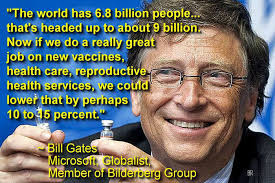Bill Gates wrote an Op Ed in Feb. 2017 for Business Insider Australia
A new kind of terrorism could wipe out 30 million people --
and we are not prepared
It’s also true that the next epidemic could originate on the computer screen of a terrorist intent on using genetic engineering to create a synthetic version of the smallpox virus . . . or a super contagious and deadly strain of the flu.
The point is, we ignore the link between health security and international security at our peril.
Whether it occurs by a quirk of nature or at the hand of a terrorist, epidemiologists say a fast-moving airborne pathogen could kill more than 30 million people in less than a year. And they say there is a reasonable probability the world will experience such an outbreak in the next 10-15 years.
And even if the next pandemic isn’t on the scale of the 1918 flu, we would be wise to consider the social and economic turmoil that might ensue if something like Ebola made its way into a lot of major urban centres.
The good news is that with advances in biotechnology, new vaccines and drugs can help prevent epidemics from spreading out of control. And, most of the things we need to do to protect against a naturally occurring pandemic are the same things we must prepare for an intentional biological attack.
We need to invest in vaccine innovation
First and most importantly, we have to build an arsenal of new weapons — vaccines, drugs, and diagnostics.
Vaccines can be especially important in containing epidemics. But today, it typically takes up to 10 years to develop and licence a new vaccine. To significantly curb deaths from a fast-moving airborne pathogen, we would have to get that down considerably — to 90 days or less.
We took an important step last month with the launch of a new public-private partnership called the Coalition for Epidemic Preparedness Innovations. The hope is that CEPI will enable the world to produce safe, effective vaccines as quickly as new threats emerge.
Of course, the preventive capacity of a vaccine won’t help if a pathogen has already spread out of control. Because epidemics can quickly take root in the places least equipped to fight them, we also need to improve surveillance.
The third thing we need to do is prepare for epidemics the way the military prepares for war. This includes germ games and other preparedness exercises so we can better understand how diseases will spread, how people will respond in a panic, and how to deal with things like overloaded highways and communications systems.
ARE WE INVOLUNTARY PLAYERS IN A GERM GAME FOR DIAGNOSTICS
Because in Nov. of 2018 he stated at an epidemic conference
Bill Gates thinks a coming disease could kill 30 million people within 6 months -- and says we should prepare for it as we do for war
- The next deadly disease that will cause a global pandemic is coming, Bill Gates said in April at a discussion of epidemics.
- We’re not ready.
- An illness like the pandemic 1918 influenza could kill 30 million people within six months, Gates said, adding that the next disease might not even be a flu, but something we’ve never seen.
- The world should prepare as it does for war, Gates said.
The likelihood that such a disease will appear continues to rise.
New pathogens emerge all the time as the world population increases and humanity encroaches on wild environments.
It’s becoming easier and easier for individual people or small groups to create weaponised diseases that could spread like wildfire around the globe.
According to Gates, a small non-state actor could
build an even deadlier form of smallpox in a lab.
Gates presented a simulation by the Institute for Disease Modelling that found that a new flu like the one that killed 50 million people in the 1918 pandemic
would now most likely kill 30 million people within six months.
And the disease that next
takes us by surprise is likely to be one we see for the first time at the start of an outbreak, like what happened recently with SARS and MERS viruses.
But we’re not yet good enough at rapidly identifying
the threat from a disease and coordinating a response,
as the global reaction to the latest Ebola epidemic showed.
WATCHING THAT SIMULATION FROM A LITTLE MORE THAN A YEAR AGO....
WTF IS REALLY GOING ON?!

21stcenturywire.com
